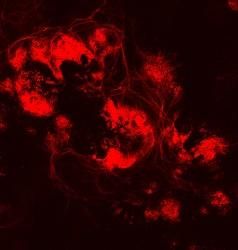Stem Cells to Nerve Cells
Small synthetic molecule initiates differentiation of adult neuronal rat brain cells to neurons
Adult neuronal stem cells have the potential to mature into functional nerve cells (neurons) and neuron support cells (astroglia). The mechanisms for this process are thus far not well understood. Researchers at the Scripps Research Institute in the USA have now synthesized an agent called neuropathiazol, a small molecule that induces neuronal rat brain stem cells to selectively differentiate to form neurons.
To date, no cure has been found for neurodegenerative diseases such as Alzheimer's disease, Parkinson's disease, or multiple sclerosis. Researchers have a bit of hope for stem cell therapy. Stem cells have the ability to divide throughout a lifetime without being differentiated, meaning that they can in principle develop into any desired type of cell. Neuronal stem cells from certain regions of the adult brain are in a position to differentiate into neurons, astrocytes (cells that support neurons), or glial cells (which form the electrical insulation around neuronal processes). Some substances, including retinoic acid, are known to initiate or guide differentiation, but none of these offers sufficiently high activity or selectivity.
Peter G. Schultz and his team were looking specifically for a molecule that allows neuronal stem cells to mature exclusively into neurons. To this end, they used high-throughput screening to comb through a substance library containing 50,000 heterocyclic compounds. Droplets of the dissolved substances were added to tiny cell cultures of neuronal rat brain stem cells. A special change to the cells' morphology and a reaction to specific immunostains made it possible to detect cultures with differentiated neurons. A class of 4-aminothiazolenes seemed promising. Starting from the "hits" in the screening, the researchers synthesized additional similar compounds, which they again screened. In the end they identified a particularly active compound; under the influence of neuropathiazol, more than 90% of the neuronal stem cells matured into neurons. Unlike retinoic acid, neuropathiazol does not lead to formation of astrocytes or glial cells; it even inhibits maturation to astroglia if their differentiation has already been initiated by another agent. The researchers now hope to use neuropathiazol to better understand the mechanisms involved in the differentiation of neuronal stem cells to neurons - with the goal of developing stem cell therapies for the treatment of neurodegenerative diseases.
Original publication. P. G. Schultz; "A Synthetic Small Molecule That Induces Neuronal Differentiation of Adult Hippocampal Neural Progenitor Cells"; Angewandte Chemie International Edition 2005.
Other news from the department science

Get the life science industry in your inbox
By submitting this form you agree that LUMITOS AG will send you the newsletter(s) selected above by email. Your data will not be passed on to third parties. Your data will be stored and processed in accordance with our data protection regulations. LUMITOS may contact you by email for the purpose of advertising or market and opinion surveys. You can revoke your consent at any time without giving reasons to LUMITOS AG, Ernst-Augustin-Str. 2, 12489 Berlin, Germany or by e-mail at revoke@lumitos.com with effect for the future. In addition, each email contains a link to unsubscribe from the corresponding newsletter.



















































